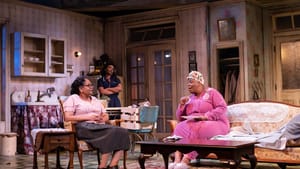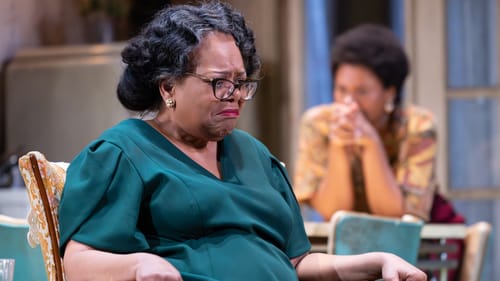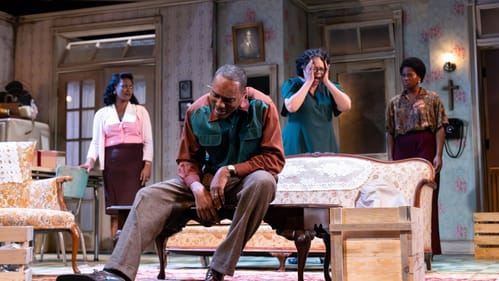Stay in the Loop
BSR publishes on a weekly schedule, with an email newsletter every Wednesday and Thursday morning. There’s no paywall, and subscribing is always free.
Doing justice to Black Shakespeare
Bristol Riverside Theatre presents Lorraine Hansberry’s A Raisin in the Sun

Lorraine Hansberry’s A Raisin in the Sun, about the working-class struggles of an African American family, debuted in 1959, but it reflects modern struggles like abortion access, housing insecurity, and the challenge of living versus just surviving. It’s a complex play requiring a strong cast to make it sing. Bristol Riverside Theatre's (BRT) production, directed by Lisa Strum, hits every note, from the visualization of social pain to the expression of Black joy.
A Raisin in the Sun follows the increasing internal tensions of the Younger family in 1950s Chicago. Walter Lee (Walter DeShields) is frustrated with his status as a Black man in a white patriarchal society. His wife, Ruth (Martine Fleurisma), struggles with an unwanted pregnancy and an emotionally distant husband. His med-school-bound sister Beneatha (Brittany Davis) embraces identity politics even as her family mocks her journey. Walter’s mother, Lena (Patricia Floyd), uses her fear of past racial injustices to prevent her family from moving forward. With four adults forced into a two-bedroom apartment, everyday difficulties place an additional layer of pain.
Excellent cast, believable intimacy
It’s impossible to distinguish a standout performance here because each member of the cast is excellent, sitting easily in their roles. From walk-ons to the leads, the whole ensemble blends so well that the directorial team's supportive, creative leadership is evident. (On opening night, assistant director Tamara Anderson received a surprise standing ovation.)
Fleurisma grounds the play from start to finish with her boiling frustration, underlying sorrow, and natural transitions from sadness to affection. Once I stopped comparing DeShields’s Walter to Sidney Poitier’s more sedate version in the 1961 film (starring the cast of the historic Broadway premiere), I enjoyed his easy charisma and relaxed physicality and the desperate frustration that finally emerges in the second act. Davis’s Beneatha has a fiery first act but loses some of that passion in the second unless directly sparring with Walter (admittedly, it’s tough to carry such intense emotions for the three-hour runtime). Floyd plays all sides of her suppressive yet supportive matriarch character.

As Beneatha’s boyfriend George Murchison, Brandon Pierce is the perfectly toxic metrosexual whom single women will recognize from their dating life. His character’s casual belief that women should put out and shut up doesn’t undermine his preppy charm or clear attraction to Beneatha. Playing nosy neighbor Mrs. Johnson in addition to assistant directing, Anderson brought down the house with a couple lines.
And shoutout to intimacy director Noelle Diane Johnson: couples scenes including Walter and Ruth, as well as Beneatha with her other suitor, Joseph Asagai (the charming yet inspiring Dayo Olatokun), are sultry, subtle, and seductive.
Black women anchor the story
This production forced me to acknowledge the play’s feminist overtones. I used to see Walter as downtrodden by systemic racism, Beneatha as comic relief, and both Ruth and Lena as gentle supporting matriarchs. But now I see how the female characters ground the play. While the second act follows Walter’s social development, the women bookmark the play’s opening and closing while anchoring the first act. I also now see beyond the characters’ standard stereotypes. Although Beneatha sounds naïve, she’s the only one who questions her family’s survivor mentality. Although Walter is understandably frustrated at the racism that limits his opportunities, he’s still extremely self-focused and flaky, allowing his wife to pick up the financial slack when he skips work, goes out drinking, or gives his son funds he lacks.
Hansberry reveals how Black women have the same racial and social difficulties as Black men yet are expected to unquestioningly support them both financially and emotionally. Ruth struggles in a subservient maid position while pregnant and caring for her immediate and extended family, and she gives Walter money when he wastes it. But when Beneatha calls out Walter’s selfishness, Lena and Ruth both rush to support him.

Lena exemplifies African American people who fight against external stereotypes yet maintain them internally. Traumatized by lynchings in childhood, she’s afraid to consider a world where she can vacation or even live outside her racially segregated neighborhood. She resorts to violence when her worldview is challenged or mocks Beneatha’s attempt to express herself outside of just surviving.
What hasn’t changed
I feel that modern white audiences see A Raisin in the Sun to marvel at how different things were back then, while African American people consider how nothing has changed. Fast-forward 65 years and Walter could be an Uber driver; Ruth still an overworked maid. Beneatha would still face hair politics and sexist incel boyfriends at home. The “welcoming committee” would be people who voted for Obama while discouraging Black mobility. And with Roe v. Wade overturned, Ruth’s abortion fears would remain front and center.
Although the play features a mostly Black cast, the text speaks to our contemporary gig economy and universally shows how money can restrict inner growth. It isn’t until an insurance check arrives that the family finally allows themselves to start dreaming, to enjoy each other, and to support Beneatha’s new perspectives.
The wrong type of laughter
My only concern is the wrong type of laughter. Back when Dave Chappelle was the Dave Chappelle I related to, he described leaving his self-titled Comedy Central sketch show in 2005 when he heard what he termed the wrong type of laughter from a white crew member over a race-themed sketch. I felt this in the BRT audience when they laughed at the Younger family’s obvious pain, including Ruth berating her son (Aasim Iqbal) out of his living-room bed, Lena beating Beneatha for declaring her atheism, and Walter declaring his fealty to “The Man.” I viewed these as difficult scenes highlighting economic frustration, but others who found them funny apparently didn’t grasp the underlying message. I also would’ve loved to see more young people, or even more diversity from the BIPOC rainbow, in the opening-night audience.
Diversity every day
Hansberry is Black Shakespeare. To pull off a play this complex, mixing humor and melancholy, takes a talented team. This production has it in spades.
My ongoing complaint is that most theaters show diverse drama primarily during February and rarely reflect that diversity in offstage, admin, and hospitality roles. I’m glad that BRT partnered with Bucks County NAACP and will sponsor a Black Theatre/Black Professionals Night on Friday, February 16, but I’d love to see the producing directors gladhanding theater-goers they don’t already know or incorporating more diverse talent into their administrative and management staff. BRT has accepted the challenge of diversity onstage. I hope they carry it behind the scenes.
What, When, Where
A Raisin in the Sun. By Lorraine Hansberry, directed by Lisa Strum. Through February 18, 2024, at Bristol Riverside Theatre, 120 Radcliffe Street, Bristol. (215) 785-0100 or brtstage.org.
Accessibility
Bristol Riverside Theatre is a wheelchair-accessible venue (excluding the second floor). Call the box office when purchasing to request wheelchair accommodations.
Masks are optional.
Sign up for our newsletter
All of the week's new articles, all in one place. Sign up for the free weekly BSR newsletters, and don't miss a conversation.

 An Nichols
An Nichols